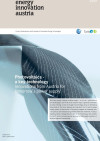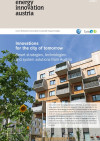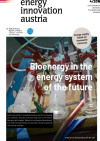Suchergebnisse für "Factsheet: Energietechnologien gestalten, die für alle sinnvoll und nutzbar sind"
CoolAIR - Predictive control of natural nighttime ventilation and daylight-optimized shading for passive building cooling
Natural nighttime ventilation and daylight-optimized shadowing are high potential approaches to efficiently and economical cool buildings. Nevertheless, the full potential cannot be acquired, since, if at all, such behavior is manually initiated by users. Goal of this project is the development of an automated, self-learning system that can assess the full cooling capabilities and establish an alternative to conventional air conditioning systems.
Elaboration of the conditions to build up a reuse-cycle network for WEEE
Selection of electrical and electronic equipment disposed as waste back into a reuse-cycle, bulding up an operational network between social enterprises, linking up and improving the workflows necessary for this purpose and the creation of a second-hand-shop for electrical an electronic equipment.
Photovoltaics - a key technology

Innovations from Austria for tomorrow`s power supply
energy innovation austria
2/2017
Herausgeber: BMVIT und Klima- und Energiefonds
Englisch, 8 Seiten
Downloads zur Publikation
Innovations for the city of tomorrow

Smart strategies, technologies and system solutions from Austria
energy innovation austria
4/2016
Herausgeber: BMVIT und Klima- und Energiefonds
Englisch, 16 Seiten
Downloads zur Publikation
Bioenergy in the energy system of the future

Energy supply based on renewable resources.
energy innovation austria
4/2019
Herausgeber: BMVIT und Klima- und Energiefonds
Englisch, 12 Seiten
Downloads zur Publikation
Evaluation of temperature differentiation on a room-by-room basis in passive house apartments
In the passive house Utendorfgasse a room–by-room temperature control was installed in 11 apartments. The experiences were evaluated from a technological and from a sociological point of view.
Investigation of Industrial Processes (IEA- Solar Heating and Cooling Program, Task 33)
The central aim of this international research cooperation is to make industrial processes accessible for solar thermal plants. To achieve this aim basic information is elaborated and components as well as system engineering concepts are developed. Furthermore the intention of Task 33/IV is to survey a detail state of the art in the field of solar process heat that has a validity for Europe. The work of JOANNEUM RESEARCH - Institute of Sustainable Techniques and Systems focuses mainly on the contents of Subtask B.
PassiveHouseDataBase - International Passive House and Passive House Plus Database
About 3.000 buildings are documented, all of them show a high level of comfort and follow energy and building technique standards for passive houses and plus-passive houses. By integration of object and evaluation data, the database will become the worldwide basis for extremely energy efficient buildings and because of its multilingualism and quality assurance opens up new sustainable export possibilities.
KlimaStadtLinz2030: Linz and its path to climate neutrality by 2030 - Preparation for the EU - Mission “100 Climate-neutral Cities by 2030”
The research project investigates whether and how it is possible for the city of Linz to achieve climate neutrality by 2030 within its own sphere of influence. A common vision, which is being developed with the citizens in a participatory manner, unites the opportunities that arise for the city through the measures necessary for this goal.
Connection of innovative strategies and technologies to a holistic, resources-friendly plus energy building (FUTUREbase)
On the basis of a construction project in Giefinggasse 4 in Vienna the combination of new, innovative strategies and technologies to an integrated, resources conserving plus energy building with high signaling and multiplication effect had been tested for feasibility. A regional, energetical bond between the buildings TECHbase, ENERGYbase and the Klima-Windkanal had been developed.
EnergieAudioAkademie - Development and usage of audiofiles for the training of professionals from the building sector
Important issues in building energy efficiency will be prepared as audio files. The target groups are builders and plumbers. The files complement existing training and educational programs and will be disseminated via CDs and/or USB sticks to the target groups via craftsmen networks and an internet platform.
Sustainability Skills - A qualification programme for founders of new businesses
A modular and web-based "Sustainability Skills" qualification programme on how to think, plan, and act in terms of sustainability and how to successfully apply these skills in a business environment.
Strategies and Operator Tools for Grid Restoration with Massive Renewable Energy Sources (RestoreGrid4RES)
RestoreGrid4RES faces the future renewable based generation structure within the transformation to a renewable and ecological power supply. The project had been funded in the frame of the „Joint Programming Platform Smart Energy Systems“ (JPP SES).
Product Service Systems Water
Based on former FdZ projects in the area of PSS, EMA and Zero Emission PSS Water develops and realises a guideline with which sustainable water management in industry and public utiliies as a service can be offered.
GREEN BIOREFINERY - Technical, economic and ecological optimisation of value chains by the introduction and efficient use of sustainable raw materials (SUSPRISE Joint Call)
Green Biorefinery stands for the sustainable and highly integrated processing of green biomass into multiple products. The project deals with the assessment and development of required technology for selected feedstock and evaluates market potential for out-products as well as the implementation potential for introduced processes.
M-DAB2: Material intensity of inner development - resource assessment and localization of urban development potentials
For the first time, the material intensity of inner development (in terms of material quantities) for different design variants is to be considered in the evaluation of inner development potentials. A set of methods for the holistic evaluation of potential areas and different development variants and scenarios for resource-saving inner development will be created.
Innovative Concepts for Pumped Storage in Liberalized Grids
In liberalized grids the requirements for pumped storage equipment rise dramatically. The development of a controllable pump turbine to help stabilize the grid is one of the possible solutions to this problem.
CellPor - cellulose polymerized - new methods for the processing of a polymer-cellulose-foam according to ecological criteria in construction
The development of a spray applicable cellulose composite as insulating material on the basis of renewable resources, combined by the development of a prototype for the spray-on technology for processing the new, water free cellulose composite are the demanding challenges of this project.
IEA PVPS Task 12: PV Environmental Health And Safety (working period 2016-2018)
The aim of IEA PVPS Task 12 is to foster international collaboration in the area of photovoltaics and environment. That includes compiling and disseminating accurate Information on environment, health, safety, and other aspects of sustainability associated with the life-cycle of photovoltaics. The austrian contribution addresses LCA, implementation of sustainability aspects and dissemination.
Energy-Sponge: The Building as an Energy-Sponge - Electricity In - Heat Out
Innovative, dynamic control concepts had been developed which enable (air) heat pumps in combination with PV- or renewable grid electricity to use the building mass of a multi-familiy house as heat storage. User acceptance had been evaluated and possible business models had been developed.
